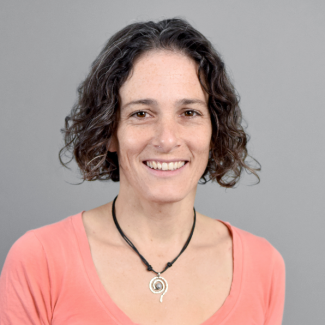Deborah Salon
Tempe Campus
Deborah Salon studies transportation in cities with the goal of contributing to our collective understanding of how these systems work, and how policies and smart investments might improve them. The methods she uses range from qualitative, interview-based research to advanced econometric analysis. Salon has substantial experience with both discrete and continuous quantitative data analysis, survey design, GIS, and management of large datasets.
Topically, Salon’s research is divided into four related tracks:
(1) Travel behavior, the built environment, and lifestyle choices in the United States,
(2) Climate policy for the transport sector,
(3) Urban transport, poverty, and economic development – both in the cities of the developing world and in the US, and
(4) Local government and transit agency institutional analysis.
A common thread in all of her work is to inform policies that aim to reduce global automobile dependence in one way or another. This overarching goal is one that she is committed to, as it becomes increasingly clear that technology-only strategies are unlikely to be enough to make our transportation system environmentally sustainable.
Salon holds a doctorate in agricultural and resource economics from the University of California at Davis. Before joining the faculty at ASU, she completed a post-doctoral fellowship at Columbia University's Earth Institute and subsequently held a research appointment at U.C. Davis's Institute of Transportation Studies.
Ph.D. Agricultural and Resource Economics, University of California-Davis
B.A. Physics, Carleton College
- Hedonic modeling of commercial property values: distance decay from the links and nodes of rail and highway infrastructure. Kihwan Seo, Deborah Salon, Michael Kuby, and Aaron Golub. Transportation 2018.
- Pavement Condition and Residential Property Values: A Spatial Hedonic Price Model for Solano County, CA. Kihwan Seo, Deborah Salon, Fraser Shilling, and Michael Kuby. Public Works Management and Policy 2018.
- Determinants of pedestrian and bicyclist crash severity by party at fault in San Francisco, CA. Deborah Salon and Andrew McIntyre. Accident Analysis and Prevention 110, 2018, 149-160.
- Transportation sustainability in the urban context: A comprehensive review. Selima Sultana, Deborah Salon, and Michael Kuby. Urban Geography 2017.
- Can location value capture pay for transit? Organizational challenges of transforming theory into practice. Deborah Salon, Elliott Sclar, and Richard Barone. Urban Affairs Review 2017.
- Estimating pedestrian and cyclist activity at the neighborhood scale. Deborah Salon. Journal of Transport Geography 55, 2016,11-21.
- Introduction to the special issue on Sustainable Transportation. Susan Handy, Cynthia Lin-Lawell, and Deborah Salon. Research in Transportation Economics 52, 2015, 1-2.
- Heterogeneity in the relationship between the built environment and driving: Focus on neighborhood type and travel purpose. Deborah Salon. Research in Transportation Economics 52, 2015, 34-45.
- Empirical distributions of vehicle use and fuel efficiency across space: Implications of asymmetry for policy analysis. Jonathan Cook, James Sanchirico, Deborah Salon, and Jeffrey Williams. Transportation Research Part A: Policy and Practice, 78, 2015, 187-199.
- The impact of bus rapid transit and metro rail on property values in Guangzhou, China. Deborah Salon, Jingyan (Dora) Wu, and Sharon Shewmake. Transportation Research Record: Journal of the Transportation Research Board, 2452, 2014, 36-45.
- Local climate action: Motives, enabling factors, and barriers. Deborah Salon, Sinnott Murphy, and Gian-Claudia Sciara. Carbon Management, 5(1), 2014, 67-79.
- Do public transit investments promote economic development? Evidence from Bogotá, Colombia. David Heres de Valle, Darby Jack, and Deborah Salon. Transportation, 2013, 1-18.
- Measuring the impacts of local land use policies on vehicle miles of travel: The case of the first big box store in Davis, CA. Kristin Lovejoy, Gian-Claudia Sciara, Deborah Salon, Susan Handy, and Patricia Mokhtarian. Journal of Transportation and Land Use 6(1), 25-39, 2013.
- How do local actions affect VMT? A critical review of the empirical evidence. Deborah Salon, Marlon Boarnet, Susan Handy, Steven Spears, and Gil Tal. Transportation Research Part D, 17(7), 495-508, 2012.
- Inclusion of regional transit emissions in local GHG inventories: Comparison of methods with examples from Portland, OR and the San Francisco Bay Area, CA. Frank Gallivan, Elizabeth Sall, Eric Hesse, Deborah Salon, and Chris Ganson. Transportation Research Record: Journal of the Transportation Research Board, 2270, 142-151, 2012.
- Urban travel in Nairobi, Kenya: Analysis, insights, and opportunities. Deborah Salon and Eric Aligula. Journal of Transport Geography, 22(1), 65-76, 2012.
- Mobility, poverty, and gender: Travel “choices” of slum residents in Nairobi, Kenya. Deborah Salon and Sumila Gulyani. Transport Reviews, 30(5), 641-657, 2010.
- City carbon budgets: A proposal to align incentives for climate-friendly communities. Deborah Salon, Daniel Sperling, Alan Meier, Sinnott Murphy, Roger Gorham, and James Barrett. Energy Policy, 38, 2032-2041, 2010.
- Reducing greenhouse gas emissions from transportation. Daniel Sperling, Deborah Salon, and Nic Lutsey. Chapter in a Planners Advisory Service monograph entitled “Rebuilding America”, 2009.
- Neighborhoods, cars, and commuting in New York City: A discrete choice approach. Deborah Salon. Transportation Research Part A: Policy and Practice, 43(2), 180-196, 2009.
Research Activity:
- Do electric vehicles need subsidies? A comparison of ownership costs for conventional, hybrid, and electric vehicles (with Hanna Breetz)
- Heterogeneity in the relationship between biking and the built environment (with Matthew Wigginton Conway, Kailai Wang, and Nathaniel Roth)
- Does informal transit complement or compete against formal transit? Case study of commuter vans in Eastern Queens, New York (with Catherine Musili)
- A geographical analysis of pass through truck traffic in the US (with David King and Arnold Maltz)
- A spatial analysis of housing and transportation affordability in Los Angeles County (with Evelyn Blumenberg, Trevor Thomas, and Jeffrey Williams)
- Sustainability policy at the local level: A survey of California cities (with Gian-Claudia Sciara and Hanna Breetz)
- Identifying place types in the United States (with Nathaniel Roth)
Transportation Planning
Urban Planning
Spatial & Economic Analysis
